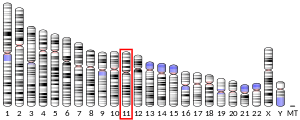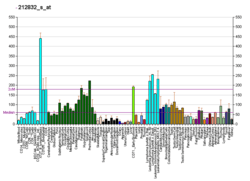CKAP5
Cytoskeleton-associated protein 5 is a microtubule-associated protein that in humans is encoded by the CKAP5 gene.[5][6][7] It is the homolog of the Xenopus protein XMAP215[8] and is also known as ch-Tog.
It has at least two distinct roles in spindle formation: it protects kinetochore microtubules from depolymerization by MCAK (KIF2C), and ch-Tog plays an essential role in centrosomal microtubule assembly, a function independent of MCAK activity.[9]
Interactions
CKAP5 has been shown to interact with TACC1.[10][11]
gollark: Damage from cryonics is a mere (possibly 3 hard) engineering issue which will be fixed if it is fixable and technology keeps advancing.
gollark: Again, spare resources and stuff.
gollark: Maybe unfreezing people initially costs a few billion $ so only some weird billionaires are unfrozen at first, but advancing technology will make it cheaper eventually.
gollark: Historically speaking, the future has had more "spare" resources than the past.
gollark: Stupid why?
References
- GRCh38: Ensembl release 89: ENSG00000175216 - Ensembl, May 2017
- GRCm38: Ensembl release 89: ENSMUSG00000040549 - Ensembl, May 2017
- "Human PubMed Reference:". National Center for Biotechnology Information, U.S. National Library of Medicine.
- "Mouse PubMed Reference:". National Center for Biotechnology Information, U.S. National Library of Medicine.
- Nagase T, Miyajima N, Tanaka A, Sazuka T, Seki N, Sato S, Tabata S, Ishikawa K, Kawarabayasi Y, Kotani H (Jul 1995). "Prediction of the coding sequences of unidentified human genes. III. The coding sequences of 40 new genes (KIAA0081-KIAA0120) deduced by analysis of cDNA clones from human cell line KG-1". DNA Res. 2 (1): 37–43. doi:10.1093/dnares/2.1.37. PMID 7788527.
- Charrasse S, Mazel M, Taviaux S, Berta P, Chow T, Larroque C (Feb 1996). "Characterization of the cDNA and pattern of expression of a new gene over-expressed in human hepatomas and colonic tumors". Eur. J. Biochem. 234 (2): 406–13. doi:10.1111/j.1432-1033.1995.406_b.x. PMID 8536682.
- "Entrez Gene: CKAP5 cytoskeleton associated protein 5".
- Cassimeris L, Morabito J (2004). "TOGp, the human homolog of XMAP215/Dis1, is required for centrosome integrity, spindle pole organization, and bipolar spindle assembly". Mol. Biol. Cell. 15 (4): 1580–90. doi:10.1091/mbc.E03-07-0544. PMC 379257. PMID 14718566.
- Barr AR, Gergely F (2008). "MCAK-independent functions of ch-Tog/XMAP215 in microtubule plus-end dynamics". Mol. Cell. Biol. 28 (23): 7199–211. doi:10.1128/MCB.01040-08. PMC 2593372. PMID 18809577.
- Conte N, Delaval B, Ginestier C, Ferrand A, Isnardon D, Larroque C, Prigent C, Séraphin B, Jacquemier J, Birnbaum D (Nov 2003). "TACC1-chTOG-Aurora A protein complex in breast cancer". Oncogene. 22 (50): 8102–16. doi:10.1038/sj.onc.1206972. PMID 14603251.
- Lauffart B, Howell SJ, Tasch JE, Cowell JK, Still IH (Apr 2002). "Interaction of the transforming acidic coiled-coil 1 (TACC1) protein with ch-TOG and GAS41/NuBI1 suggests multiple TACC1-containing protein complexes in human cells". Biochem. J. 363 (Pt 1): 195–200. doi:10.1042/0264-6021:3630195. PMC 1222467. PMID 11903063.
External links
- Human CKAP5 genome location and CKAP5 gene details page in the UCSC Genome Browser.
Further reading
- Basto R, Gergely F, Draviam VM, Ohkura H, Liley K, Raff JW (2007). "Hsp90 is required to localise cyclin B and Msps/ch-TOG to the mitotic spindle in Drosophila and humans". J. Cell Sci. 120 (Pt 7): 1278–87. doi:10.1242/jcs.000604. PMID 17376965.
- Kosturko LD, Maggipinto MJ, D'Sa C, Carson JH, Barbarese E (2005). "The microtubule-associated protein tumor overexpressed gene binds to the RNA trafficking protein heterogeneous nuclear ribonucleoprotein A2". Mol. Biol. Cell. 16 (4): 1938–47. doi:10.1091/mbc.E04-08-0709. PMC 1073673. PMID 15703215.
- Beausoleil SA, Jedrychowski M, Schwartz D, Elias JE, Villén J, Li J, Cohn MA, Cantley LC, Gygi SP (2004). "Large-scale characterization of HeLa cell nuclear phosphoproteins". Proc. Natl. Acad. Sci. U.S.A. 101 (33): 12130–5. doi:10.1073/pnas.0404720101. PMC 514446. PMID 15302935.
- Cassimeris L, Morabito J (2004). "TOGp, the human homolog of XMAP215/Dis1, is required for centrosome integrity, spindle pole organization, and bipolar spindle assembly". Mol. Biol. Cell. 15 (4): 1580–90. doi:10.1091/mbc.E03-07-0544. PMC 379257. PMID 14718566.
- Conte N, Delaval B, Ginestier C, Ferrand A, Isnardon D, Larroque C, Prigent C, Séraphin B, Jacquemier J, Birnbaum D (2003). "TACC1-chTOG-Aurora A protein complex in breast cancer". Oncogene. 22 (50): 8102–16. doi:10.1038/sj.onc.1206972. PMID 14603251.
- Gergely F, Draviam VM, Raff JW (2003). "The ch-TOG/XMAP215 protein is essential for spindle pole organization in human somatic cells". Genes Dev. 17 (3): 336–41. doi:10.1101/gad.245603. PMC 195983. PMID 12569123.
- Nakayama M, Kikuno R, Ohara O (2002). "Protein-protein interactions between large proteins: two-hybrid screening using a functionally classified library composed of long cDNAs". Genome Res. 12 (11): 1773–84. doi:10.1101/gr.406902. PMC 187542. PMID 12421765.
- Lauffart B, Howell SJ, Tasch JE, Cowell JK, Still IH (2002). "Interaction of the transforming acidic coiled-coil 1 (TACC1) protein with ch-TOG and GAS41/NuBI1 suggests multiple TACC1-containing protein complexes in human cells". Biochem. J. 363 (Pt 1): 195–200. doi:10.1042/0264-6021:3630195. PMC 1222467. PMID 11903063.
- Bonaldo MF, Lennon G, Soares MB (1996). "Normalization and subtraction: two approaches to facilitate gene discovery". Genome Res. 6 (9): 791–806. doi:10.1101/gr.6.9.791. PMID 8889548.
- Nakamura S, Grigoriev I, Nogi T, Hamaji T, Cassimeris L, Mimori-Kiyosue Y (2012). "Dissecting the nanoscale distributions and functions of microtubule-end-binding proteins EB1 and ch-TOG in interphase HeLa cells". PLoS ONE. 7 (12): e51442. doi:10.1371/journal.pone.0051442. PMC 3520847. PMID 23251535.
- Zanic M, Widlund PO, Hyman AA, Howard J (2013). "Synergy between XMAP215 and EB1 increases microtubule growth rates to physiological levels". Nat. Cell Biol. 15 (6): 688–93. doi:10.1038/ncb2744. PMID 23666085.
This article is issued from Wikipedia. The text is licensed under Creative Commons - Attribution - Sharealike. Additional terms may apply for the media files.




